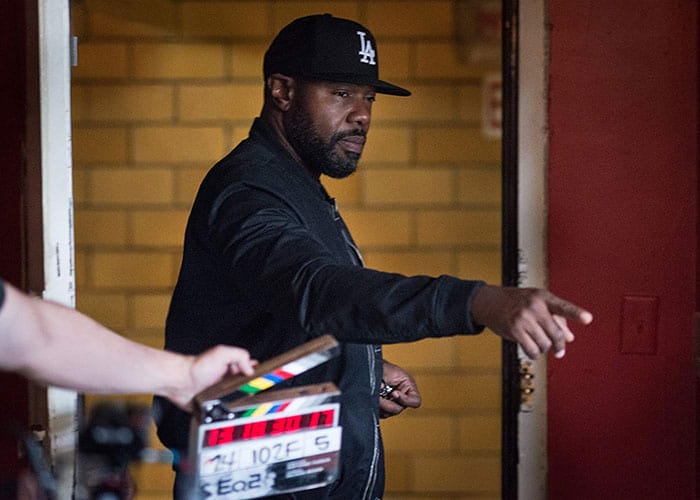Filmmakers tend to be extra noteworthy when they step out of their comfort zones, and this is what Antoine Fuqua seems to be doing with his latest feature. We are well-versed in his grounded dramatic offerings — think Training Day and Southpaw. Yet the director, who has been somewhat open to genre experimentation in the past (crafting stylishly violent vigilante thrillers like The Equalizer movies in recent years), is evidently diving headfirst into a project that could be a little more fantastical. The Hollywood Reporter announced that Fuqua will direct a “time-spanning action thriller” titled Infinite for Paramount Pictures.
Scripted by Ian Shorr, who previously worked on the television adaptation of Training Day, Infinite follows an eponymous group of men and women who have the ability to continually reincarnate for centuries on end. Notably, the members of this practically immortal clan have been given a job with a superheroic twist. The fate of the Earth rests in the Infinite’s hands as an evildoer of some vague description is purportedly hellbent on destroying the planet. Crucially, the group must enlist the help of the unlikeliest ally: a schizophrenic man whose vivid dreams are really “memories from past lives” that holds the key to this ominous villain’s defeat.
As far as film synopses go, this one does dish out a good deal of information about where the film is potentially headed, warts and all. It is abundantly clear that Infinite already sounds more than a little goofy. And that’s not an unreasonable assumption to make this early in the development process, considering how famed blockbuster producer Lorenzo di Bonaventura — the man behind silly big picture romps like the Transformers, Red, and GI: Joe franchises — is directly involved in bringing Infinite to life.
That said, there may be hope for Infinite should it further push Fuqua into more ambitious territory within the realm of genre filmmaking. He has really shown too much flair to be kept away from unadulterated popcorn flicks in general, but dealing with sci-fi and fantasy tropes like time travel and immortality marks a stark shift away from his usual material. Arguably, this is a necessary change of pace for Fuqua.
Oftentimes, his signature flourishes — namely his penchant for delivering kinetic thrills and having an indelible way with wonderfully charismatic actors — suffer as a result of lackluster scripts that are overly busy and only brush the surface of in-depth character moments. A number of Fuqua’s movies could do well to sharpen their focus overall, especially when they aim to include some level of pathos.
Training Day — a truly solid movie — doesn’t need to be bogged down by a twisty plot in order to be a gritty crime drama of excellent caliber, especially with the likes of Denzel Washington and Ethan Hawke knocking performances out of the park. Southpaw deluges harrowing challenges onto its leading man Jake Gyllenhaal, but the film doesn’t gel completely thanks to a bloated, cliched screenplay with scattered interests. King Arthur, Fuqua’s first blockbuster, can’t decide if it wants to be self-serious or unapologetically permissive with its historical inaccuracies. The Magnificent Seven isn’t totally memorable or satisfying in spite of the talents of a killer ensemble, because it doesn’t properly commit to either indulging in genre conventions or dissecting archetypes found in Western movies (to be fair, though, Fuqua did say he just wanted to see Washington ride a horse).
Regardless, there is one thing we can savor in a Fuqua film and that is the intense impact of his impeccably crafted action set pieces. They tend to bring his typically lengthy movies (back) to life in a distinctive and gleefully bombastic way. For instance, one of the most solid takeaways from The Equalizer is the cathartic Home Mart showdown simply due to its vivid, dynamic choreography. View it below.
Alongside the technical prowess and appealing visual daring of the action, this final scene is actually uncannily rewarding due to The Equalizer‘s single-minded. Fuqua’s direction and Mauro Fiore’s cinematography keenly follow Washington’s cool vigilante enforcer and easily encourages us to root for him. The filmmaker’s classic grit is still present; Washington’s commanding, contemplative grasp of the eponymous role provides an unusual and intriguing counterpoint to the ultraviolence of calculated bloodsoaked vengeance that he leaves in his wake. Nonetheless, that sense of rumination allows the film to hit its stride once it lands in full action extravaganza mode as it unequivocally makes Washington’s protagonist a hero that we can empathize with.
The Equalizer and its unconventional and equally action-packed sequel provide a suitable blueprint for Fuqua possibly heading towards genre movie glory. We’re ready for more of it. Fuqua delightfully buys into the cheesy moments that ripple through this duology (or potential trilogy). His proclivity for framing sharply elegant fight scenes feels so undeniably at home when it gets to supplement films that tell decidedly unreal stories. That’s not to say that Fuqua shouldn’t make any more Training Days. Still, to see him play that irreverence is fun enough in a revenge series. Translating those skills into a time-bending affair could be endlessly entertaining.

